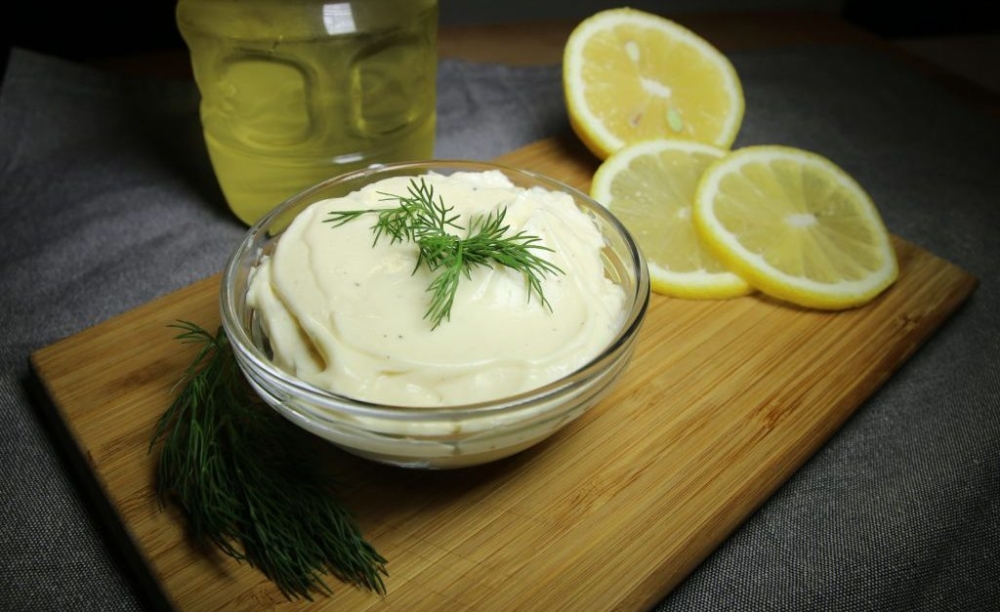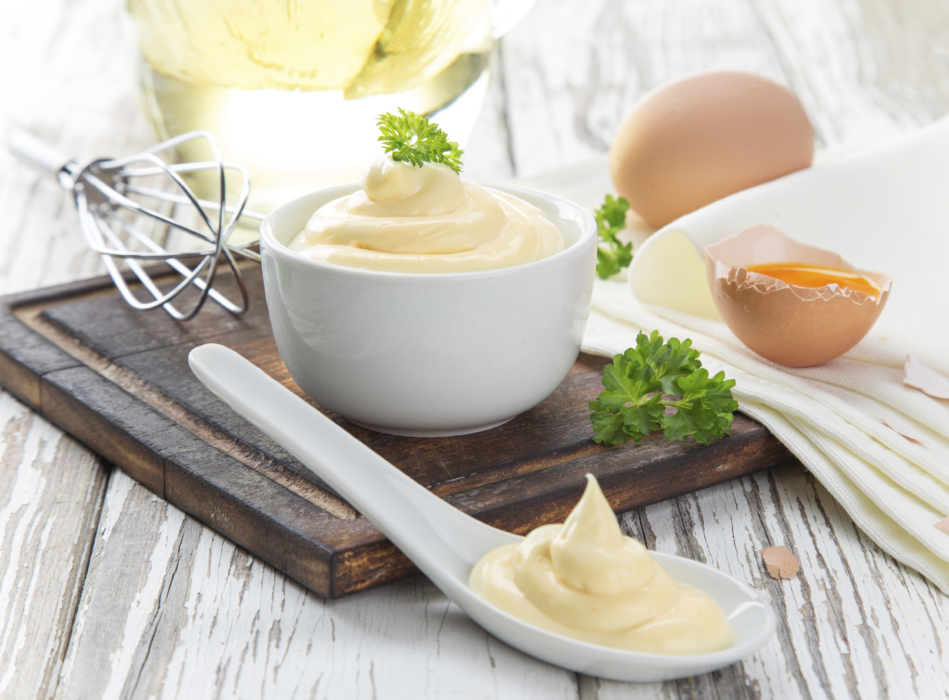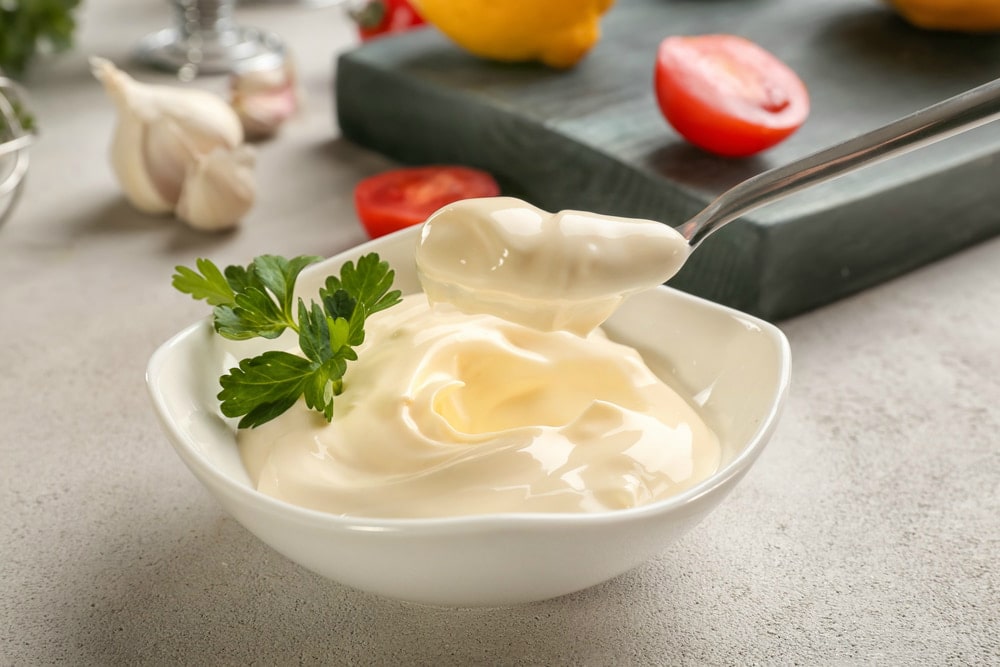Mayonnaise is the most popular sauce of our time. Although it was invented for a long time, in such quantities as today, people have never consumed mayonnaise. The sauce is added to most salads, season soups, and put in the preparation of fry, goulash and other dishes. Have you thought about how many calories in mayonnaise? If so, this article will help answer this question.
Material Content:
Chemical composition and nutritional value
The composition of the product is simple. It includes eggs (chicken or quail), vegetable oil, mustard, citric or acetic acid, salt and sugar. It seems like everything is natural, and therefore useful. But no matter how! The plants produce mayonnaise on an industrial scale, and instead of eggs lay egg powder at best, and at worst - water and thickeners. But let's not immediately talk about the bad, let's try to consider the chemical composition and nutritional value.
 Mayonnaise consists mainly of fats (the percentage should be looked at on the package, and it can vary from 50 to 80 g), then go carbohydrates, proteins, ash and cholesterol. But, in addition to this, there are the following substances:
Mayonnaise consists mainly of fats (the percentage should be looked at on the package, and it can vary from 50 to 80 g), then go carbohydrates, proteins, ash and cholesterol. But, in addition to this, there are the following substances:
- saturated fats;
- polyunsaturated fats;
- monounsaturated fats;
- interchangeable and essential amino acids;
- vitamins: A, E, B1, B2, PP;
- Minerals: potassium, calcium, sodium, magnesium, phosphorus, iron.
Next, consider the calorie content of mayonnaise, it depends on the fat content of the product.
Calorie purchased and homemade mayonnaise
The most high-calorie in mayonnaise is vegetable oil. The energy value of this product is about 900 kcal per 100 g. Of course, mayonnaise does not consist only of oil, it contains additional ingredients, each with its own calorie content.
So, in a purchased sauce, an average of 500 to 700 kcal per 100 g of product.Agree, such a supplement is clearly not suitable for a diet.
In homemade mayonnaise, the energy value is slightly lower and averages 600 kcal.
 It is worth remembering that the mayonnaise "Easy", "Dietary" and others with a similar name, it is poison for the body! The fact is that manufacturers, in order to reduce calorie content, add water to the oil, refuse eggs. But since fats and water are immiscible products, chemical thickeners have to be used. The stomach is more grateful to respond to a large portion of real mayonnaise than to the scanty “Light”.
It is worth remembering that the mayonnaise "Easy", "Dietary" and others with a similar name, it is poison for the body! The fact is that manufacturers, in order to reduce calorie content, add water to the oil, refuse eggs. But since fats and water are immiscible products, chemical thickeners have to be used. The stomach is more grateful to respond to a large portion of real mayonnaise than to the scanty “Light”.
But eating 100 grams of sauce at a time is simply unrealistic. Of course, if you do not pour a pack of dumplings! And yet, for the most part, the product is used to dress salad or soup, so you should find out how many calories are in a tablespoon of mayonnaise. In 1 tbsp. l about 15 g of sauce is placed. That is, you add about 90-100 kcal to the dish, this is a decent amount.
Better use sour cream, it is tastier, nourishing and healthier, and even less caloric.
Daily intake
Remember that mayonnaise is fats, fats, and again fats! There are very few proteins, a little more carbohydrates and a huge amount of cholesterol. On average, a person needs 3,000 kcal per day for normal life, but we are not fed with mayonnaise alone.
If a package of 100 g is poured into a salad, then you will add about 700 kcal to the dish, which is almost a quarter of the daily requirement, but there are other components in the salad. In order not to increase the sides, it is better to refuse mayonnaise altogether or use it no more than 1-2 tablespoons per day.
People with cardiovascular diseases are also advised to consume no more than 20-30 grams of fatty sauce per day, since it contains a lot of cholesterol. This component clogs the vessels, forming plaques on them, which exacerbates the course of the disease.
The benefits and harms of the product
If you consider the product from a medical point of view, you can find a lot of positive points. Of course, it will be possible to get the benefit from the sauce if you take one that is prepared only from natural ingredients, without adding "chemistry". Why is it useful:
- It arouses appetite, normalizes digestion. Mayonnaise contributes to all this due to the ability to help the body secrete a sufficient amount of gastric juice.
- The composition contains vegetable oil, it is enriched with vitamins E, F, beta-carotene, and all this is simply necessary for humans.
- The sauce contributes to the rapid digestibility of food.
- The lecithin present in the composition has a beneficial effect on the central nervous system and liver function.
- Mayonnaise is not recommended for the children's menu, for people with diseases of the gastrointestinal tract, heart and blood vessels, with obesity, hypertension, arrhythmia.
- Even a light mayonnaise will not help to lose extra pounds, so during a diet it is better to completely abandon the sauce. And choosing between "Provence" and "Light Salad", give preference to the first. Let it have more calories, but less harmful chemical compounds.
As for the harm of the product, here everything is without secrets. Everyone should know that fats, albeit vegetable, have a bad effect on the general state of health, contribute to weight gain, and mayonnaise is especially harmful to the heart and circulatory system.
Cook the sauce yourself at home. Yes, the calorie content will be a little less, but you will know that there are no chemical additives or preservatives in the sauce, and only natural, fresh ingredients are used.














